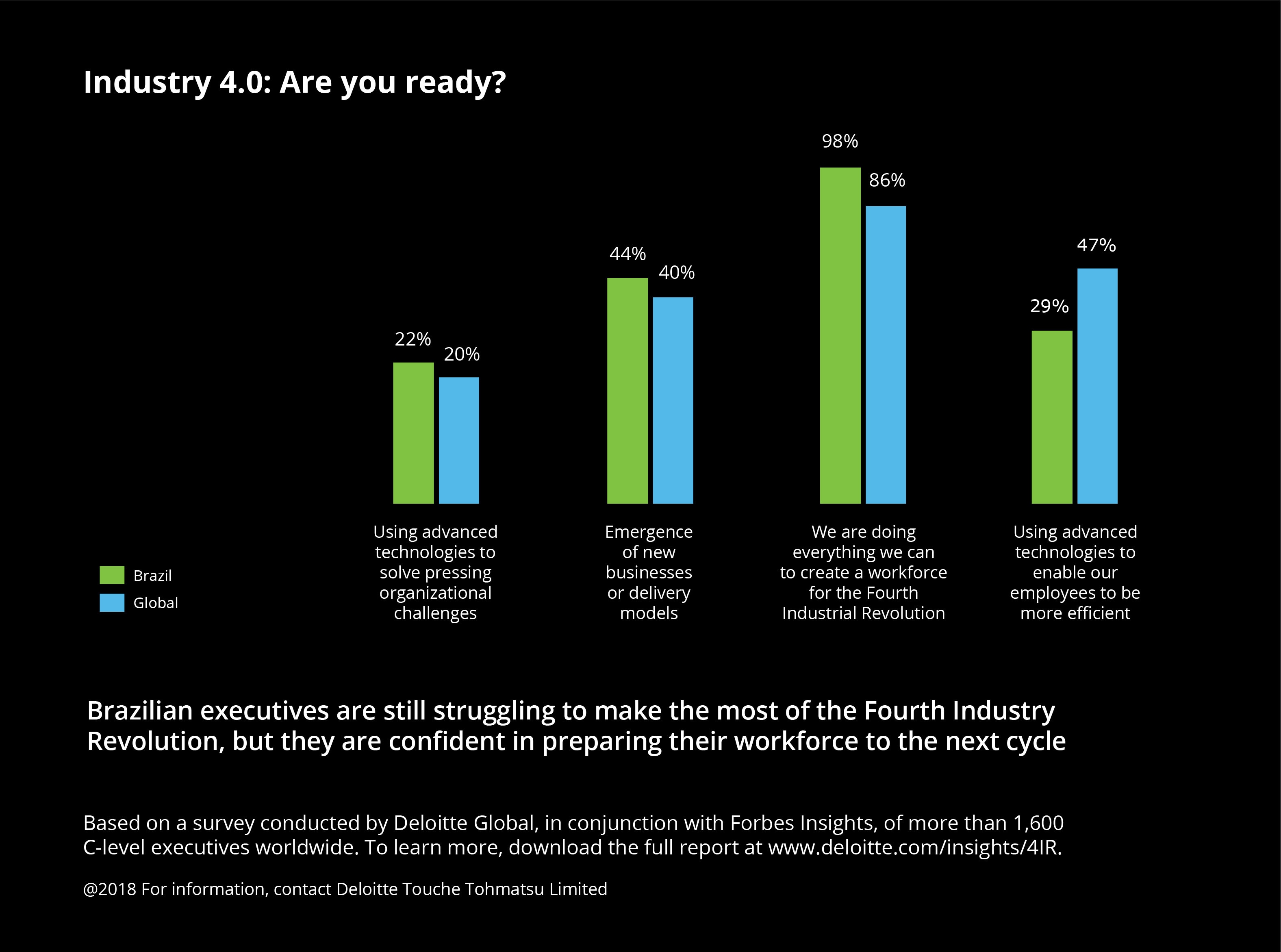Is Latin America ready for the Fourth Industrial Revolution?

A few companies are transforming and succeeding in Industry 4.0 in Brazil.
Image: REUTERS/Paulo Whitaker
Stay up to date:
Technological Transformation
After three years of declining economic activity and an uncertain business environment, recent indices in Brazil are signalling hope for the country’s recovery. Those positive signs are echoed by a comprehensive Deloitte survey, “Brazil’s Agenda 2018”, which suggests more decision-makers are betting on the growth of consumption and, consequently, the continuity of a gradual upturn in Latin America’s largest and most diversified economy.
Deloitte interviewed leaders from 750 companies that represent 36 sectors of the Brazilian economy, and 26% of the nation’s GDP. The survey shows that leaders are turning their organizations’ attention toward issues that will have long-term impact and improve competitiveness.
It found 56% of companies expect to release new products or services in 2018, an increase of 11% from the prior year. Almost one in five leaders expect higher sales this year, and 41% of respondents expect to increase the number of employees, a marked increase from 2017.
Leaders pointed to Brazil’s increased investment in infrastructure, as well as tax and social security reforms, as primary reasons for their optimism. On the other hand, rising interest rates in the US and the slowdown of China’s economy were cited as events that could hamper business in an economy that’s already affected by a number of different factors.
One of these is the so-called “Brazil Cost”, which refers to increased operational expenses associated with doing business in the country. Decision makers in both government and the private sector have dedicated much time and effort to study and deal with historical problems caused by the “Brazil Cost”, which makes goods and services more expensive locally, relative to almost every country in the world. It will remain an issue for the foreseeable future.

At the same time, local competitiveness is being influenced, perhaps to an even greater degree, by the global transformation known as the “Fourth Industrial Revolution”, or “Industry 4.0”.
We are living in a unique moment in history. Changes, made possible by new technologies and the ongoing conversion of information into data and digital channels, permeate our lives and impact how companies do business. This new technological age touches everything, from interpersonal relationships and modes of consumption to the management structure of organisations and the legal and regulatory environments in which they operate.
Industry 4.0 is not solely about technology or digital tools and methodologies. It represents an upheaval that will force huge changes within companies that plan to keep operating in the region, and will impact the abilities of companies in the emerging world to survive. Remember that Brazil had not completed the industrial development cycle when the service sector started dominating the local economy. That’s why the impacts of this revolution on Brazil and other Latin American countries will be dramatic and likely more disruptive than in other parts of the world. The challenge to adapt local operations to this new industrial revolution is huge.
A Deloitte Global study launched at Davos in January 2018, “Industry 4.0: Are you ready?”, includes insights from the leaders of more than 100 Brazilian companies. Their answers reveal their priorities as they walk the path toward the Fourth Industrial Revolution – a path that requires a complete business transformation. The urgency for businesses to reinvent themselves helps explain why the Brazilian government is launching a range of measures to support companies in this rapidly evolving business environment. Such measures are important, but they are far from being enough to face the breadth of the problem.
There are good examples of private companies transforming and succeeding in Industry 4.0, but unfortunately they are few. We need to start a new business revolution in the region, one that will promote medium and long-term economic, business and social dividends for companies, workers, governments and society throughout the region. This is the long-term revolution that Brazil requires today.
Don't miss any update on this topic
Create a free account and access your personalized content collection with our latest publications and analyses.
License and Republishing
World Economic Forum articles may be republished in accordance with the Creative Commons Attribution-NonCommercial-NoDerivatives 4.0 International Public License, and in accordance with our Terms of Use.
The views expressed in this article are those of the author alone and not the World Economic Forum.
Forum Stories newsletter
Bringing you weekly curated insights and analysis on the global issues that matter.
More on Fourth Industrial RevolutionSee all
Harald Haas and Mallik Tatipamula
August 1, 2025
Neeti Mehta Shukla
August 1, 2025
Umesh Sachdev
July 31, 2025
Mark Esposito
July 24, 2025



